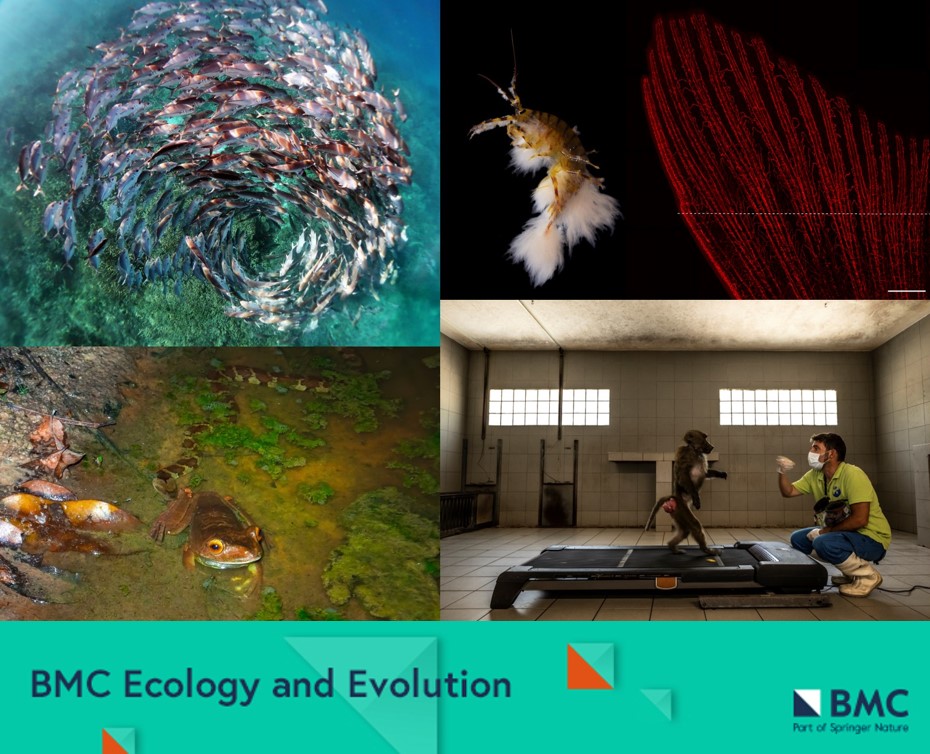BMC Ecology and Evolution Image Competition 2022
Published in Ecology & Evolution

We are delighted to announce the launch of our second BMC Ecology and Evolution image competition! Submit your images and the stories behind them for a chance to highlight your research, win prizes, and have your photography featured in the journal.

Its predecessor, the BMC Ecology Image competition, ran for a successful seven years, attracting substantial attention from ecologists and the wider public. Past winning images have featured in international media outlets such as The Guardian, IFL Science, Scientific American and the BBC.
The image competition provides a fantastic opportunity to showcase research and the beauty of nature to a broad audience. Anyone affiliated with a research institution is eligible to enter up to one image to each of the following four categories:
- Research in action. Images that showcase ecological or environmental biology research or capture experiences of conducting studies and collecting data.
- Relationships in nature. Photos depicting symbiosis, including parasitism, plant-fungi relationships, plant-pollinator interactions, mimicry, mutualism, commensalism, cleaning symbiosis, and co-evolutionary relationships.
- Biodiversity under threat. Photos depicting threats or efforts to conserve biodiversity.
- Life close up. Photos displaying biology that is not often seen using close-up or macro photography.
Judging and prizes
Judging the competition will be members of the BMC Ecology and Evolution editorial board, along with Jenny Harman, the Editor of the journal. The journal will award the overall winner €800, and the winner for each of the four categories will receive €200. The journal will also award €50 to the runner up for each category.
How to submit your images and the stories behind them:
Please email your images to the Editor, Jenny Harman, at jennifer.harman@springernature.com with the subject line “BMC Ecology and Evolution Image Competition” and include the following :
- Your name:
- Affiliation:
- Contact details of Research Institute:
- Twitter handle (optional):
- Category:
- Image name:
- Description (Max. 250 words):
- File type:
- Data attribution (if applicable):
- I agree to release this image under a Creative Commons License: Y/N
Please attach your image entry to your email. All images must conform to the following criteria:
- A minimum 300dpi (1831 x 1831 pixels for a raster image).
- In one of the acceptable formats – EPS, PDF (for line drawings), PNG, TIFF, JPEG, BMP, DOC, PPT [Please note that it is the responsibility of the author(s) to obtain permission from the copyright holder to reproduce figures or tables that have previously been published elsewhere.]
In line with our policies on open access, entry to the competition implies releasing the images under a creative commons license to allow file sharing with proper attribution.
Submit your images now!
We’ll be posting regular updates on the competition in the coming months, so don’t forget to keep up to date by reading our blog or by following us on Twitter @BMC_series
The closing date for entries is the 1st July 2022, with winners announced in August 2022.
Good luck!
Follow the Topic
-
BMC Ecology and Evolution

An open access, peer-reviewed journal interested in all aspects of ecological and evolutionary biology.
Related Collections
With Collections, you can get published faster and increase your visibility.
Bioacoustics and soundscape ecology
BMC Ecology and Evolution welcomes submissions to its new Collection on Bioacoustics and soundscape ecology. By studying how animals use sound and how noise impacts them, you can learn a lot about the well-being of an ecosystem and the animals living there. In support of the United Nations Sustainable Development Goals (SDGs) 13: Climate action, 14: Life below water and 15: Life on land, the Collection will consider research on:
The use of sound for communication
The evolution of acoustic signals
The use of bioacoustics for taxonomy and systematics
The use of sound for biodiversity monitoring
The impacts of noise on animal development, behavior, sound production and reception
The effect of anthropogenic noise on the physiology, behavior and ecology of animals
Innovative technologies and methods to collect and analyze acoustic data to study animals and the health of ecosystems
Reviews and commentary articles are welcome following consultation with the Editor
(Jennifer.harman@springernature.com).
Publishing Model: Open Access
Deadline: Mar 27, 2026
Impact of climate change on ecology and evolution
BMC Ecology and Evolution is calling for submissions to our Collection on Impact of climate change on ecology and evolution. This Collection seeks to explore how climate change alters ecological dynamics and evolutionary processes, including shifts in phenology, local adaptations, and responses to invasive species. By understanding these shifts, we can gain insights into the resilience of ecosystems and the adaptive capacity of species in a rapidly changing world.
The significance of this research is underscored by the ongoing challenges posed by climate change, which threatens biodiversity and disrupts ecosystems. Recent advances in ecological modeling and genetic analyses have provided new tools to assess the impacts of environmental change on species and communities. These insights are crucial for developing conservation strategies and management practices aimed at mitigating the effects of climate change and preserving biodiversity for future generations.
Continued research in this area promises to enhance our understanding of the interplay between climate change and ecological dynamics. As new data emerges, we may uncover novel adaptive strategies employed by species in response to environmental shifts, revealing patterns of gene flow, population dispersal, and phenotypic plasticity. This knowledge can inform conservation strategies that are increasingly vital in an era of unprecedented environmental change.
•Climate change and biodiversity loss
•Phenotypic plasticity in response to environmental change
•Effects of invasive species on ecosystems
•Local adaptation and genetic structure in changing environments
This Collection supports and amplifies research related to SDG 13: Climate Action and SDG 15: Life on Land.
Publishing Model: Open Access
Deadline: Mar 03, 2026





Please sign in or register for FREE
If you are a registered user on Research Communities by Springer Nature, please sign in
Well done!